Intel's X25-V & Kingston's 30GB SSDNow V Series: Battle of the $125 SSDs
by Anand Lal Shimpi on March 19, 2010 12:00 AM EST- Posted in
- Storage
Overall System Performance using PCMark Vantage
Next up is PCMark Vantage, another system-wide performance suite. For those of you who aren’t familiar with PCMark Vantage, it ends up being the most real-world-like hard drive test I can come up with. It runs things like application launches, file searches, web browsing, contacts searching, video playback, photo editing and other completely mundane but real-world tasks. I’ve described the benchmark in great detail before but if you’d like to read up on what it does in particular, take a look at Futuremark’s whitepaper on the benchmark; it’s not perfect, but it’s good enough to be a member of a comprehensive storage benchmark suite. Any performance impacts here would most likely be reflected in the real world.
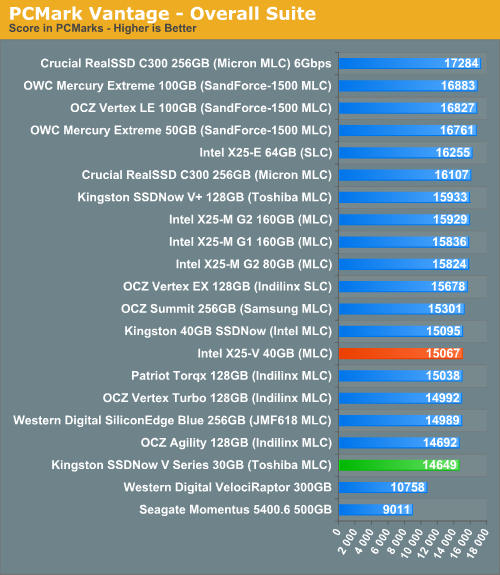
The Intel and Kingston value drives manage to stay close throughout almost all of the PCMark benchmarks. In the Productivity and HDD tests Intel manages to pull ahead by a noticeable margin however.
The memories suite includes a test involving importing pictures into Windows Photo Gallery and editing them, a fairly benign task that easily falls into the category of being very influenced by disk performance.
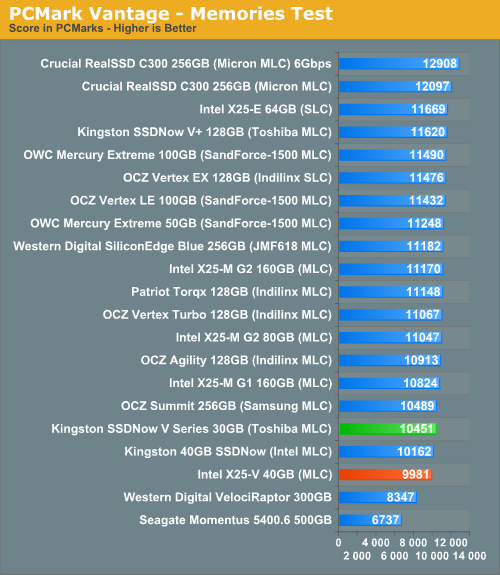
The TV and Movies tests focus on on video transcoding which is mostly CPU bound, but one of the tests involves Windows Media Center which tends to be disk bound.
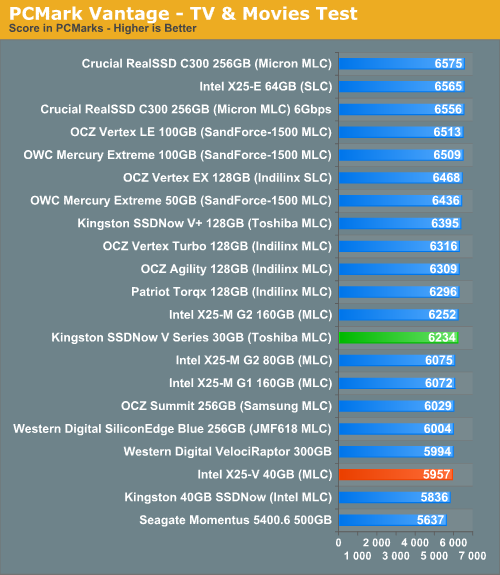
The gaming tests are very well suited to SSDs since they spend a good portion of their time focusing on reading textures and loading level data. All of the SSDs dominate here, but as you'll see later on in my gaming tests the benefits of an SSD really vary depending on the game. Take these results as a best case scenario of what can happen, not the norm.
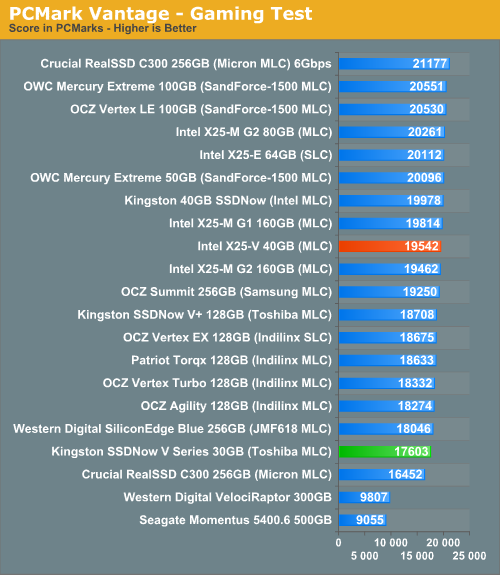
In the Music suite the main test is a multitasking scenario: the test simulates surfing the web in IE7, transcoding an audio file and adding music to Windows Media Player (the most disk intensive portion of the test).
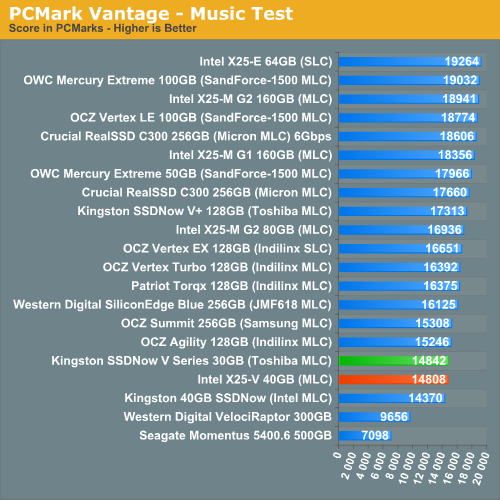
The Communications suite is made up of two tests, both involving light multitasking. The first test simulates data encryption/decryption while running message rules in Windows Mail. The second test simulates web surfing (including opening/closing tabs) in IE7, data decryption and running Windows Defender.
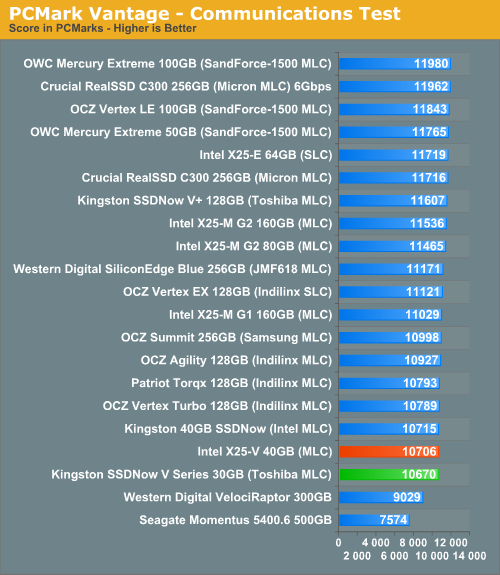
I love PCMark's Productivity test; in this test there are four tasks going on at once, searching through Windows contacts, searching through Windows Mail, browsing multiple webpages in IE7 and loading applications. This is as real world of a scenario as you get and it happens to be representative of one of the most frustrating HDD usage models - trying to do multiple things at once. There's nothing more annoying than trying to launch a simple application while you're doing other things in the background and have the load take forever.
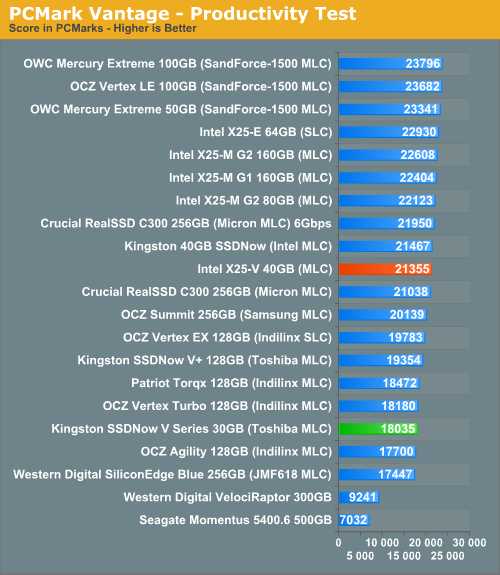
The final PCMark Vantage suite is HDD specific and this is where you'll see the biggest differences between the drives:
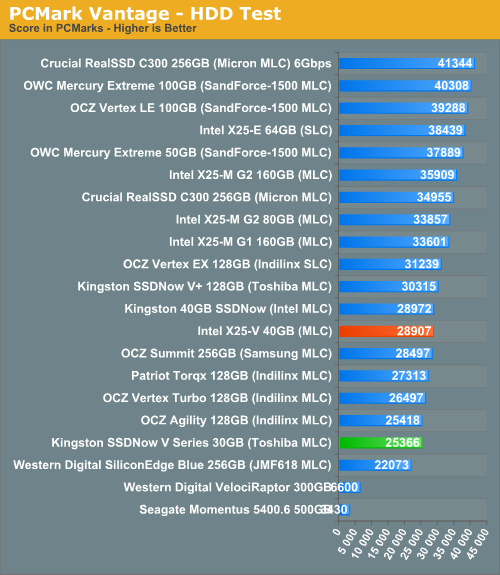










78 Comments
View All Comments
jed22281 - Saturday, March 27, 2010 - link
Given it's in a similar size category...Shouldn't the 50GB OWC Mercury Extreme be included in this?
Or is it only allowed to sit in X25-M territory?
Is that the only other competitor for the Mercury Extreme?
If true...
In which scenario/s might one pick the Extreme over the X25-M?
Thank-you!
thllxb - Saturday, March 27, 2010 - link
I actually bought one intel-v 40g and i got the shipment today. The sequential read is very good, 190mb/s with nvidia SATA controller driver and 170mb/s with win7 driver. However, the random read speed is only 22mb/s with both drivers, much lower than the test result 60mb/s. I still need to find out why.jed22281 - Friday, March 26, 2010 - link
Given it's in a similar size category...Shouldn't the 50GB OWC Mercury Extreme be included in this?
Or is it only allowed to sit in X25-M territory?
Is that the only other competitor for the Mercury Extreme?
If true...
In which scenario/s might one pick the Extreme over the X25-M?
Thank-you!
jed22281 - Thursday, March 25, 2010 - link
^^^ anyone? thank-you!jed22281 - Thursday, March 25, 2010 - link
^^^ anyone? thank-you!jed22281 - Wednesday, March 24, 2010 - link
Given it's in a similar size category...Shouldn't the 50GB OWC Mercury Extreme be included in this?
Or is it only allowed to sit in X25-M territory?
Is that the only other competitor for the Mercury Extreme?
If true...
In which scenario/s might one pick the Extreme over the X25-M?
Thank-you!
NandFlashGuy - Sunday, March 21, 2010 - link
Hi Anand,I think it's misleading that you continue using the phrase "IMFT Nand". This gives the impression that all IMFT Nand is equivalent.
IMFT does not sell Nand -- they are the just legal way that Micron and Intel can share the cost of manufacturing Nand together. Each parent company has the ability to define their own litho process or their own test strategies.
This means that the Nand on the X-25 series is "Intel Nand", not IMFT or Micron Nand. Moreover, the Nand on the X-25 series receives much more extensive testing than what is sold to the removable memory market.
chuckbam - Saturday, March 20, 2010 - link
Because of the growth size of the winsxs folder, I think 40GBs are to small for a boot drive.sdsdv10 - Sunday, March 21, 2010 - link
That might be the case for you, but not for everyone. I just upgraded my father-in-law's PC with one of the Intel 40GB SSD and a 250GB regular HD for data storage. Installation of Windows 7 Home Premium left just under 23GB of usable space. Besides IE, the only other thing he needed was Office 2003 (this took less than 350MB total). Still had 22GB of space left. It boots up very quick and opening programs in very fast (nearly instantaneous). A nice improvement over the previous incarnation with XP on a regular 7200rpm HD.JimmiG - Saturday, March 20, 2010 - link
28 or 37GB is definitely too small for me. If you're going to buy a SSD to speed things up, there must be enough space on it to actually install some stuff on it to speed up. If you can only speed up a few percent of your disk operations, it's pretty pointless.60GB would be the minimum for me, preferably 80+ GB. 30GB is barely enough for Win7 itself *or* a couple of games. I'm using 410GB on my "Applications" drive, the one that contains the OS and games and programs I use (almost no user data like movies or pictures).